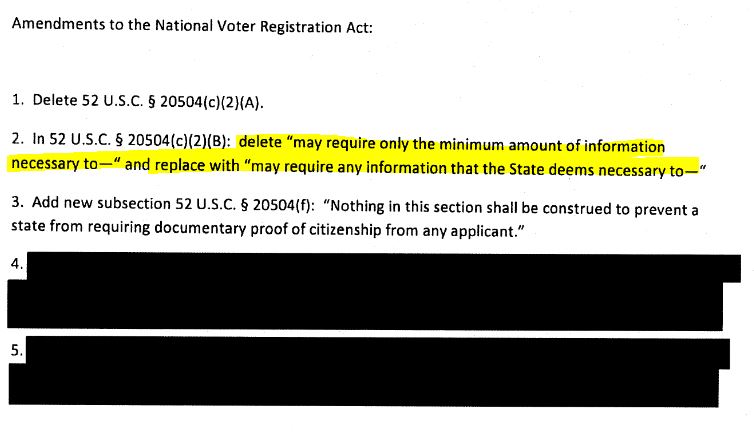Kansas Secretary of State Kris Kobach (R) is currently defending his state’s documentary proof of citizenship law in federal court, arguing that the law is necessary because of the substantial number of noncitizens registering to vote. But if he doesn’t succeed, he has already prepared what he is calling a “contingency plan.”
The text of that plan is identical to language written by the American Civil Liberties Union (ACLU), the group that sued Kobach over the law.
In an April 2016 brief, the ACLU explained that for Kobach’s proof of citizenship law to be legal, the National Voter Registration Act (NVRA) would have to allow states to require “any information” they want of people registering to vote. Currently, the law only requires “the minimum amount of information necessary” to prove an individual’s citizenship.
So Kobach’s contingency plan is to amend the NVRA in just that way. If he is successful in weakening the federal voting legislation — which would require the approval of Congress — states would be able to pass documentary proof of citizenship laws like Kansas’ or require virtually anything from individuals registering to vote.
Here’s the text of the ACLU’s 2016 brief:

And the text of Kobach’s proposal, which he gave to then President-elect Trump during a November 2016 meeting:

In October 2017, a judge ordered Kobach to release the text of the document he presented to Trump, titled “DEPARTMENT OF HOMELAND SECURITY KOBACH STRATEGIC PLAN FOR FIRST 365 DAYS,” which could be seen in an AP photo of Kobach and Trump taken after the meeting. In the outline, Kobach proposed five amendments to the NVRA. Two were redacted, but one visible to the public includes the language from the ACLU’s brief.
The judge also ordered Kobach to sit for a deposition last year, during which the ACLU asked about the similarities. In the deposition, which was played in federal court last week, Kobach denied that he copied the ACLU and said it was “interesting” that the group’s brief had similar language.
“The language in this item is word for word exactly the same as what the plaintiffs in this case argued previously would be precisely how the NVRA would have to be rewritten in order for states to have authority to require documentary proof of citizenship for motor voter applicants; is that correct?” asked Dale Ho, the director of the ACLU’s Voting Rights Project and the lead attorney on the case.
“I have no idea what you argued,” Kobach responded.
“I don’t consult your legal writing” in anything I do,” Kobach later added, saying he did not remember the portion of the ACLU’s brief that was identical to his own amendment. “I think it is inconceivable that I would have had your brief in my hand when drafting this.”
Kobach, who is representing himself in this litigation, objected numerous times to the ACLU showing video of his deposition in court. Judge Julie Robinson, a George W. Bush nominee, ultimately overruled and let the ACLU play a roughly 45-minute segment on Friday, although she ordered that only the transcript and not the video could not be made public.
The trial will continue for a seventh day on March 19. In the first six days, Kobach’s team of lawyers have repeatedly violated basic rules of evidence and civil procedure and have been reprimanded by Judge Robinson. On Tuesday, one of Kobach’s expert witnesses, political science professor Jesse Richman, admitted that there is no evidence that illegal voting could have swung the 2016 popular vote, as Trump and Kobach have claimed. Richman authored a study showing that 18,000 noncitizens could be on Kansas’ voter rolls, but in court this week, the ACLU exposed major flaws in his research.
Richman’s research is based on an analysis of Kansas’ suspended voter list for foreign-sounding names. In court Tuesday, Ho questioned Richman on why some Spanish names were flagged while others weren’t. At one point, Ho asked if Richman would have flagged the name “Carlos Murguia.”
Richman said yes, before Ho told him that Murguia is a federal judge in the United States District Court for the District of Kansas, the court where the trial is taking place.

